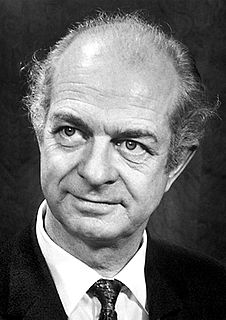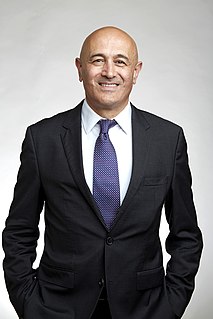Related Research Articles

Nokia Bell Labs, originally named Bell Telephone Laboratories (1925–1984), then AT&T Bell Laboratories (1984–1996) and Bell Labs Innovations (1996–2007), is an American industrial research and scientific development company owned by Finnish company Nokia. With headquarters located in Murray Hill, New Jersey, the company operates several laboratories in the United States and around the world.

Ernest Rutherford, 1st Baron Rutherford of Nelson, was a New Zealand physicist who came to be known as the father of nuclear physics. Encyclopædia Britannica considers him to be the greatest experimentalist since Michael Faraday (1791–1867). Apart from his work in his homeland, he spent a substantial amount of his career abroad, in both Canada and the United Kingdom.
Materialism is a form of philosophical monism which holds matter to be the fundamental substance in nature, and all things, including mental states and consciousness, are results of material interactions. According to philosophical materialism, mind and consciousness are by-products or epiphenomena of material processes, without which they cannot exist. This concept directly contrasts with idealism, where mind and consciousness are first-order realities to which matter is subject and material interactions are secondary.

Science is a systematic enterprise that builds and organizes knowledge in the form of testable explanations and predictions about the universe.

Wolfgang Ernst Pauli was an Austrian theoretical physicist and one of the pioneers of quantum physics. In 1945, after having been nominated by Albert Einstein, Pauli received the Nobel Prize in Physics for his "decisive contribution through his discovery of a new law of Nature, the exclusion principle or Pauli principle". The discovery involved spin theory, which is the basis of a theory of the structure of matter.

Linus Carl Pauling was an American chemist, biochemist, chemical engineer, peace activist, author, and educator. He published more than 1,200 papers and books, of which about 850 dealt with scientific topics. New Scientist called him one of the 20 greatest scientists of all time, and as of 2000, he was rated the 16th most important scientist in history. For his scientific work, Pauling was awarded the Nobel Prize in Chemistry in 1954. For his peace activism, he was awarded the Nobel Peace Prize in 1962. He is one of four people to have won more than one Nobel Prize. Of these, he is the only person to have been awarded two unshared Nobel Prizes, and one of two people to be awarded Nobel Prizes in different fields, the other being Marie Curie.

Matthew White Ridley, 5th Viscount Ridley,, is a British journalist and businessman. He is best known for his writings on science, the environment, and economics. He has written several science books, including The Red Queen: Sex and the Evolution of Human Nature (1994), Genome (1999), The Rational Optimist: How Prosperity Evolves (2010) and The Evolution of Everything: How Ideas Emerge (2015). He publishes a blog and has been a regular contributor to The Times newspaper.
Quantum optics is a branch of atomic, molecular, and optical physics dealing with how individual quanta of light, known as photons, interact with atoms and molecules. It includes the study of the particle-like properties of photons. Photons have been used to test many of the counter-intuitive predictions of quantum mechanics, such as entanglement and teleportation, and are a useful resource for quantum information processing.

Yakov Grigorevich Sinai is a Russian-American mathematician known for his work on dynamical systems. He contributed to the modern metric theory of dynamical systems and connected the world of deterministic (dynamical) systems with the world of probabilistic (stochastic) systems. He has also worked on mathematical physics and probability theory. His efforts have provided the groundwork for advances in the physical sciences.

Leonard Mlodinow is an American theoretical physicist and mathematician, screenwriter and author. In physics, he is known for his work on the large N expansion, a method of approximating the spectrum of atoms based on the consideration of an infinite-dimensional version of the problem, and for his work on the quantum theory of light inside dielectrics.
Philip Ball is a British science writer. For over twenty years he has been an editor of the journal Nature for which he continues to write regularly. He now writes a regular column in Chemistry World. He has contributed to publications ranging from New Scientist to the New York Times, The Guardian, the Financial Times and New Statesman. He is the regular contributor to Prospect magazine, and also a columnist for Chemistry World, Nature Materials and BBC Future. He has broadcast on many occasions on radio and TV, and in June 2004 he presented a three-part serial on nanotechnology, Small Worlds, on BBC Radio 4.

David James Thouless was a British condensed-matter physicist. He was the winner of the 1990 Wolf Prize and a laureate of the 2016 Nobel Prize for physics along with F. Duncan M. Haldane and J. Michael Kosterlitz for theoretical discoveries of topological phase transitions and topological phases of matter.

Giorgio Parisi is an Italian theoretical physicist, whose research has focused on quantum field theory, statistical mechanics and complex systems. His best known contributions are the QCD evolution equations for parton densities, obtained with Guido Altarelli, known as the Altarelli–Parisi or DGLAP equations, the exact solution of the Sherrington–Kirkpatrick model of spin glasses, the Kardar–Parisi–Zhang equation describing dynamic scaling of growing interfaces, and the study of whirling flocks of birds. He was awarded the 2021 Nobel Prize in Physics jointly with Klaus Hasselmann and Syukuro Manabe for groundbreaking contributions to theory of complex systems, in particular "for the discovery of the interplay of disorder and fluctuations in physical systems from atomic to planetary scales."

Steven Chu is an American physicist and former government official. He is a Nobel laureate and was the 12th United States Secretary of Energy. He is currently the William R. Kenan Jr. Professor of Physics and Professor of Molecular and Cellular Physiology at Stanford University. He is known for his research at the University of California, Berkeley, and his research at Bell Laboratories and Stanford University regarding the cooling and trapping of atoms with laser light, for which he shared the 1997 Nobel Prize in Physics with Claude Cohen-Tannoudji and William Daniel Phillips.

Jameel Sadik "Jim" Al-Khalili is an Iraqi-British theoretical physicist, author and broadcaster. He is professor of theoretical physics and chair in the public engagement in science at the University of Surrey. He is a regular broadcaster and presenter of science programmes on BBC radio and television, and a frequent commentator about science in other British media.

Sir Andre Konstantin Geim is a Russian-born Dutch-British physicist working in England in the School of Physics and Astronomy at the University of Manchester.
Paul Bruce Corkum is a Canadian physicist specializing in attosecond physics and laser science. He holds a joint University of Ottawa–NRC chair in Attosecond Photonics. He is one of the students of strong field atomic physics, i.e. atoms and plasmas in super-intense laser fields.

Sir Konstantin Sergeevich Novoselov is a Russian-British physicist, and a Professor at the Centre for Advanced 2D Materials, National University of Singapore. He is also the Langworthy Professor in the School of Physics and Astronomy at the University of Manchester. His work on graphene with Andre Geim earned them the Nobel Prize in Physics in 2010.

Susanna Mary Clarke is an English author known for her debut novel Jonathan Strange & Mr Norrell (2004), a Hugo Award-winning alternative history. Clarke began Jonathan Strange in 1993 and worked on it during her spare time. For the next decade, she published short stories from the Strange universe, but it was not until 2003 that Bloomsbury bought her manuscript and began work on its publication. The novel became a best-seller.
Social physics or sociophysics is a field of science which uses mathematical tools inspired by physics to understand the behavior of human crowds. In a modern commercial use, it can also refer to the analysis of social phenomena with big data.
References
- ↑ "Premio Lagrange 2009". Archived from the original on 2014-04-07. Retrieved 2009-06-18.